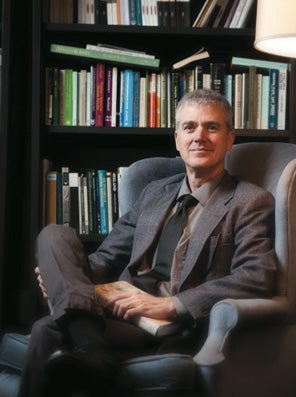He didn’t want to leave Charleston. He knew he had to write something (publish or perish, as they say), but he had a young family to take care of and he really just wanted to stay close to home. Besides – it may be a long way from his ancestral and academic roots in Ireland – but it’d be much easier to focus in Charleston.
Joe Kelly never thought, however, he’d also focus on Charleston. Now, nearly 15 years (and, don’t worry, several articles) later, the English professor has published America’s Longest Siege: Charleston, Slavery, and the Slow March Toward Civil War (2013, Overlook Press), a historical narrative about Charleston’s role in the evolution of slavery.
“Everyone asks me how a James Joyce/Irish literature expert whose trade is literary criticism ends up writing a historical narrative about American history,” he laughs. “I just backed into it.”
It all started in 2000 with an entry he wrote for the Encyclopedia of the Irish in America about the Irish population in Charleston. That’s when he became fascinated with the story of Bishop John England, a champion of Catholic emancipation who in 1820 arrived in Charleston and, appalled by the institution of slavery, devoted himself to human rights and civil liberties. This quiet hero’s story led Kelly to Henry Laurens, the second president of the Continental Congress (and one of the main proponents of establishing a college in Charleston), who protested slavery in the Revolutionary era despite having made fortunes in the slave trade.
“I just became interested in the moral stories of the people who dissented against slavery, people of conscience in the South,” says Kelly, who found many heroes among the sins of slavery – and, of course, many villains, as well. “My book is first and foremost about people, those who invented and promoted the ‘positive good theory’ of slavery, those who opposed it and those who wanted to oppose it but failed.”
The majority, perhaps, fell under the latter.
“It was generally accepted that slavery was unethical – and, as attitudes changed with every generation, the ability to justify slavery got weaker and weaker,” says Kelly, who argues against the notion that the institution only ended because of the Civil War. “Up until the 1830s, the forces of history were on the side of emancipation. Slavery would have withered on the vine in the United States if not for the hard work of a few very greedy and backhanded Charlestonians. A few men perpetuated slavery long after it would have died off naturally.”
Kelly points to founding fathers Charles Pinckney, Charles Cotesworth Pinckney, John Rutledge* and Pierce Butler for manipulating circumstances to get slavery written into the Constitution, and to John C. Calhoun, for developing and proselytizing the “positive good theory” in the 1830s, completely reversing the South’s prevailing anti-slavery attitude.
“I know I’m poking at some sacred views here, but John C. Calhoun is the biggest villain in the book,” says Kelly. “In 1820, everyone agreed that slavery was evil. By the 1860 Secession Convention, not one delegate believed that it was. We lost a whole generation that was infused with this notion. It’s the great tragedy of the South.”
Indeed, the ideology that the elite families of Charleston had forged controlled the South for decades and resulted in the Union’s two-year siege on Charleston. Kelly writes:
The history of Charleston is tragic. It follows the classic formula laid down by the Greeks more than two thousand years ago. … Once it had been the jewel of the Southern Seaboard … but its devotion to slavery sealed its sentence, and the Union’s siege of Charleston and all the Civil War’s dead, North and South, white and black, were playing out this tragic flaw.
It’s a tragedy that’s relieved only by the heroes in its story – the very characters who compelled Kelly to write his book. Even if it did hit a little close to home.
*Editor’s Note: Charles Pinckney, Charles Cotesworth Pinckney and John Rutledge were founders and trustees of the College.





